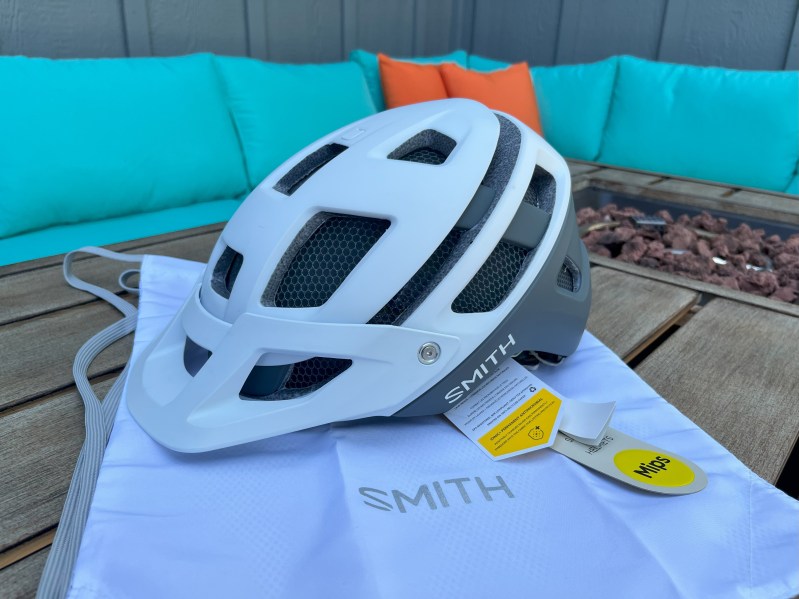
A quality mountain bike helmet is a necessity every time you hit the trails, and the Smith Forefront 2 doesn’t slouch when it comes to quality — or style for that matter.
I’ve seen quite a few riders in Smith bike helmets out on my local trails but hadn’t had the opportunity to try one for myself. Our friends over at Smith were kind enough to change that, sending a Forefront 2 for me to put through its paces.
Smith helmets come in multiple disciplines, from trail to road helmets, open-face to complete coverage full-face. The Smith Forefront 2 offers maximum protection with the open-face platform. Being one of Smith’s top trail helmets, I was eager to give the Forefront 2 a try.

The Smith Forefront 2
Smith broke into the helmet market in 2014 with the release of the Forefront. Several years, and several Smith helmets later, the Smith Forefront 2 continues to set standards in safety, style, and comfort.
The Smith Forefront 2 offers complete Koroyd protection. Smith boasts that “Koroyd absorbs energy more efficiently and with less bulk than other protective materials on the market.” The Koroyd technology in the Forefront 2 is a protective layer encompassing the entirety of the rider’s head. Koroyd’s honeycomb appearance not only absorbs impacts through collapsing cells but also allows for maximum ventilation.
In addition to Koroyd, the Forefront 2 also incorporates MIPS’s rotational force protection. This added layer of technology directs rotational forces away from the brain by allowing the head to move 10-15mm during an impact. MIPS technology has become a standard in quality helmets across action sports, and we’d expect nothing less from the Smith Forefront 2.
If you prefer to wear goggles with a helmet, the Forefront 2 may be a good option. The helmet doesn’t impede airflow due to Smith’s AirEvac technology which keeps goggles fog free. And the highly adjustable, VaporFit dial ensures a perfect fit for the rider.
Speaking of goggles and eyewear, Smith designed the Forefront 2 with integrated spots to store eye protection. The helmet’s three-position visor fits a pair of goggles when in the fully up position, and vents double as channels to guide Smith sunglasses arms, holding the eyewear firmly in place.
Twenty vents surround the helmet, providing maximum airflow. Even with sufficient ventilation, sweaty rides are inevitable. An Ionic+ antimicrobial lining in the Smith Forefront 2 helps fight a stinky helmet by controlling odor.
Completing the Smith Forefront 2’s set of features is a mesh drawstring bag, for a little extra protection while it bounces around in the back of your truck. The Forefront 2 retails for $250 and comes in 19 different colorways. Three size options—small, medium, and large—fit head sizes of 51cm up to 62cm.

The Smith Forefront 2: What I liked
Mountain bike helmets can be tricky, and often a helmet’s fit has a lot to do with the shape of your head. Some helmet manufacturers may make a rounder helmet. Others may make a helmet leaning more toward an oval shape. Your best bet is to try a few different brands at your local bike shop.
The fit
I lucked out and the Smith Forefront 2 fit me perfectly. Not only did the helmet fit the shape of my head well, I immediately found the helmet incredibly comfortable. I admit I was initially skeptical when I saw the fairly narrow and somewhat minimal padding in the helmet. Upon trying the Forefront 2 on, and especially after my first ride, my concerns were put to rest.
Ride after ride, mile after mile, the Forefront 2 has only gotten more comfortable. Smith’s VaporFit dial technology secures the helmet into place without squeezing my head. I’ve gotten headaches from helmets in the past due to my head getting squeezed. If I loosen the helmet up, it then moves around and doesn’t feel secure. With nearly 300 miles in the Smith Forefront 2, I have had zero fit problems and zero headaches.
My initial concern about the “minimal” padding inside the helmet turned out to be one of the bigger standouts to me. Not only is the padding more than sufficient, but I also found that the lower profile pads didn’t soak up and hold as much sweat as previous helmets. This meant much less sweat was dripping from the front of my helmet onto my sunglasses.
The ventilation
Since I’m on the topic of sweat, I’m happy to report that I was very pleased with how much less I sweated in the Forefront 2. I can only chalk this up to the 20 different ventilation holes around the helmet. This was easily the most well-ventilated helmet I’ve worn.
One of these vents nearly goes around the circumference of the helmet and doubles as the channel intended to hold sunglasses. The Smith Wildcat sunglasses I used fit perfectly on the helmet during long fire road climbs. I moved my head freely and was maybe even jostled a time or two but the glasses stayed put.
The safety features
While I did not have a crash where my head was impacted, it is nice to not only see MIPS technology but the addition of Koroyd as well. Years of science and data are behind technologies such as MIPS, and we have seen nearly all helmet manufacturers incorporating the tech into their brands.
I really enjoyed Koroyd for a different reason. While I appreciated the added level of impact protection, I really also like the bee protection as well. Koroyd’s honeycomb design covers nearly all of the vent holes. If you’ve ever had a bee fly into your helmet and sting you on the head, you’ll understand why this is nice. If you haven’t, I’m sure you will eventually.

Where the Forefront 2 fell short
$250 gets you one of the very best trail-riding helmets in the industry. $250 is a lot of money, though. I hate to put the cost on the “cons” list, but there are helmets out there, similar in technology and safety, for a bit less.
With that said, Smith is selling past model years of the Forefront 2 for half the price. Same helmet, just a discontinued color.
And, for $250, I would have liked to have seen a Fidlock-style buckle on the helmet strap, rather than the traditional buckle. The magnetic clasps of a Fidlock buckle make buckling your helmet with one hand a breeze.
Overall, would I recommend this Smith bike helmet? The Smith Forefront 2 really did check every single box for me. The helmet is loaded with technology to keep me safe. The Forefront 2 has many practical features that I utilized regularly. But, most of all, the helmet fit perfectly (and looked great, too).




